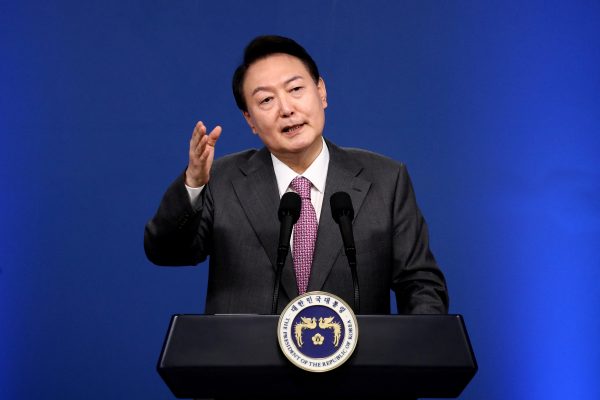Less than three months earlier, Yoon hosted US President Joe Biden in Seoul and committed to a number of measures aimed at boosting South Korea’s economic and international security.
The two leaders announced that South Korea’s two largest chipmakers, Samsung and SK Hynix, would invest billions of dollars into US semiconductor factories and that South Korea would join the Indo-Pacific Economic Framework with a dozen other inaugural members, including Australia and Japan. Seoul seems likely to join the Chip-4 alliance as well, another trade mechanism meant to tilt the semiconductor supply chain away from China.
That Seoul was receptive to not one but two new institutions with Tokyo reflects Yoon’s commitment to rebuilding ties with the other democratic US ally in Northeast Asia. Bilateral relations reached a new low under the Moon Jae-in administration, which critics say mobilised historical anti-Japanese sentiments in South Korea for political gain. Japan made that easier after restricting exports to South Korea of three key chemicals used in manufacturing semiconductors and smartphones.
The new administration in Seoul appears determined to move past this. Yoon has met Japanese Prime Minister Fumio Kishida many times and Park Jin became the first South Korean foreign minister to visit Tokyo in four years. Recent public opinion polls also suggest the South Korean and the Japanese public may also be receptive to a thaw.
The rise of China and North Korea’s repeated nuclear threats are increasingly understood as mutual threats facing the South Korean and Japanese people. The South Korean people, and President Yoon, both recognise the deflating returns to trying to play both sides in a great power competition and have lurched strongly toward the United States.
The new South Korean administration has also stated that national security is ‘not negotiable’ with China and that it will not abide by a promise from Moon not to deploy new Terminal High Altitude Area Defense batteries or join a missile defence network or even alliance with the United States and Japan.
At their summit in May, Yoon and Biden agreed to deploy US strategic assets to bolster deterrence on the peninsula and to expand the size and scale of joint military exercises after years of downsizing. The allies followed this up with the largest field training drills in years last month, Ulchi Freedom Shield, in which simulated North Korean attacks were repelled by US and South Korean forces. Yoon will also submit South Korea’s largest ever defense budget this year and is keen to expand arms exports and civilian nuclear technology.
While his foreign policies may be welcomed by Washington and its allies in the Asia Pacific, the South Korean people seem to have already grown sick of the new president.
As Karl Friendhoff points out in our lead article this week, a series of unforced errors have torpedoed Yoon’s domestic approval ratings and left him with very little political capital to press his goals abroad.
They include the decision to lower the school entry age from six to five, resulting in the resignation of the Education Minister after just 34 days. Yoon also established a new police bureau to oversee the police in a move reminiscent of South Korea’s dictatorship days, and forced his way out of the Blue House into a new presidential office creating a logistical nightmare when deadly floods marooned him in his personal residence.
‘Yoon had never held elected office before’, Friedhoff writes. ‘He has exhibited a penchant for rash, poorly-explained decisions and was about to find himself president of a highly polarised polity — factors that are not conducive to immediate success’.
Nor is his inner circle obviously equipped to give the best policy advice. ‘Most of his advisors are drawn from a small circle of associates, suggesting that the president is insulated from the wider policymaking world and is making appointments based on acquaintance rather than capability’, says Friedhoff.
Inexperience or uncertainty about which way to turn probably helps explain why the emphatically pro-US president did not bother to send a delegation to greet US House Speaker Nancy Pelosi when she arrived in Seoul early last month, or meet with her at all while she was in the country — further pulling down his approval ratings.
The upshot, Friedhoff writes, is that Yoon ‘now knows where the floor is and rebuilding the foundation is not a mystery’.
‘At the most basic level it begins with clear, effective messaging — something his administration has struggled with — and ensuring that all members of his administration are on board with that message’, says Friedhoff. Yoon reshuffled his presidential office last month, amid other personnel changes, perhaps recognising the need to start rebuilding public trust.
Yoon will travel to New York this month to speak at the UN General Assembly. He will likely use the forum to promote a staunchly pro-West, pro-alliance foreign policy and call for North Korea’s denuclearisation. Meetings with Kishida as well as Biden are apparently in the works, and Yoon may as well follow-up with Australian Prime Minister Anthony Albanese after the two met at the NATO summit in June.
But if South Korea’s new-look foreign policy is to effect permanent change in the Asia Pacific, it needs buy-in from the South Korean people.
That requires, at the very least, that Yoon learn how to package his ideas and the importance of optics. It may also necessitate a deeper conversation about and closer scrutiny of the people he has around him and perhaps more reshuffles of his administration in the future.
The EAF Editorial Board is located in the Crawford School of Public Policy, College of Asia and the Pacific, The Australian National University.

